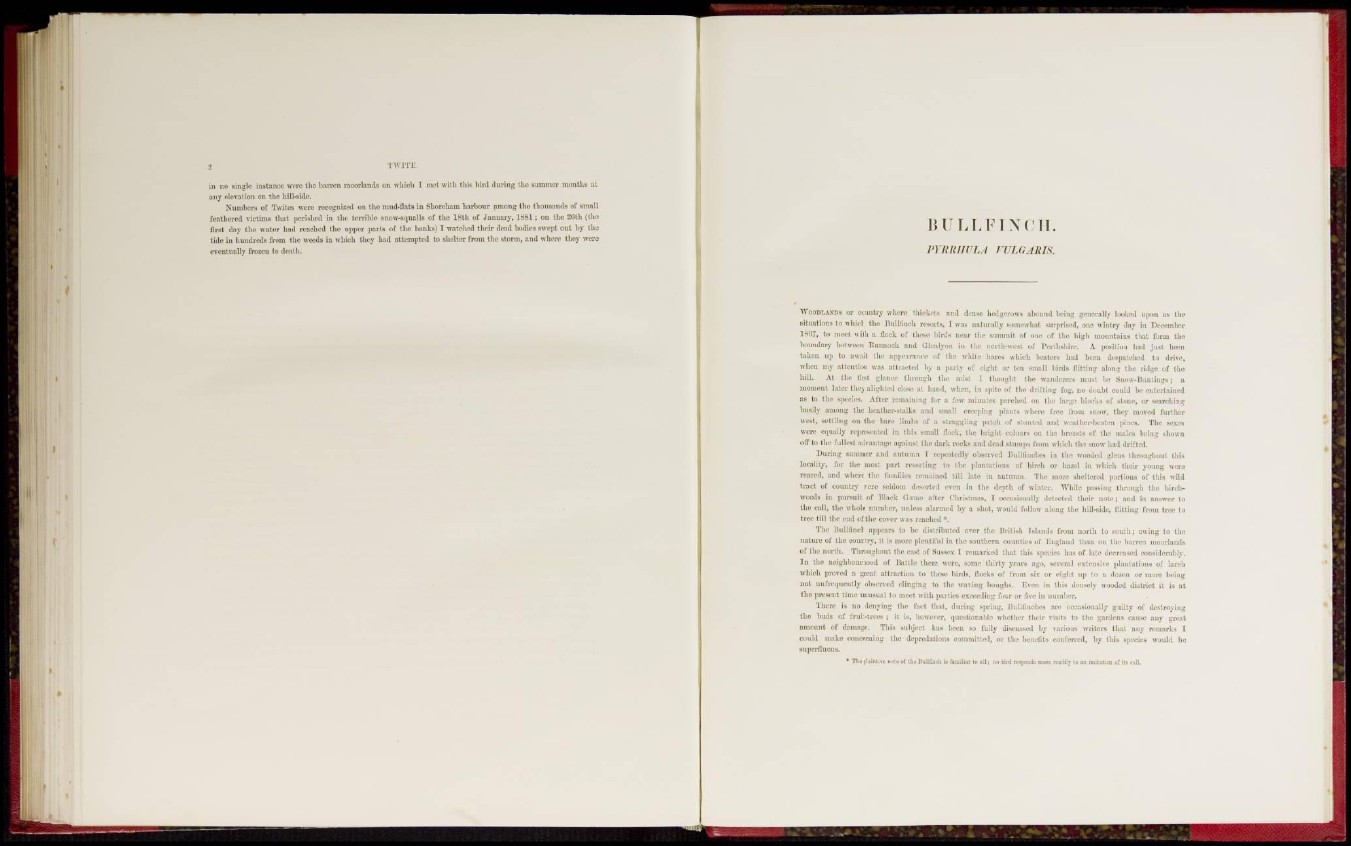
TWITE
in no single instance were tlic barren moorlands on wliieb I met with this bird during (he summer months at
any elevation on the hill-side.
Numbers of Twites were recognized on the mud-flats in Sboreliam harbour among the thousands of small
feathered victims that perished in the terrible 6iiow-squalls of the ISth of January, 1881 ; on the 20th (the
first day the water had reached the upper parts of the banks) I watched their dead bodies swept out by the
tide in hundreds from the weeds in which they bad attempted to shelter from the storm, and where they were
eventually frozen to death.
B U L L F I N C H .
VYItlUlULA VULGARIS.
WooDL.vxns or country where thicket* and dense hedgerows abnind being generally looked upon as the
situations to nhieh the Bullfinch resort*. I was naturally somewhat surprised, one "iuiry day in December
IM17, |a meet with a flock of these birds near the summit of one of the high mount I ins that form the
boundary between Baimoch and Glenlyoii in the north-west of Perthshire. A position had jost been
taken up to await the appearance of the while hares which beaters had been despatched to drive,
when my attention was attracted by a party of eight or ten small birds Hitting along the ridge of the
hill. At the first glalico through the mist I thought the wanderers must be Sunn-Bunting* ; a
moment later they slighted close at hand, when, in spite of the drifting fog, no doubt could he entertained
as to the species. After remaining for a few minutes perched on the large blocks of stone, or searching
busily among the heather-stalks and small creeping plants where free from snow, they moved further
west, settling on tho bare limbs of a straggling patch of stunted and weather-beaten piues. The sexes
wore equally represented iu this small flock, the bright colours on the breasts of the males being shown
off to the fullest advantage against the dark rocks and dead stumps from which tint snow had drifted.
During summer and autumn I repeatedly observed Bullfinches in the wooded glens throughout this
locality, for the most part resorting to the plantations id birch or liazel iu which their young were
reared, and where the families remained till late in autumn. The more sheltered portions of this wild
tract of country were seldom deserted even in the depth of winter. While passing through the birch*
woods in pursuit of Black Game after Christinas, I occasionally detected their note; and in answer to
the call, the whole number, unless alarmed by a shot, would follow along the hill-side, flitting from tree to
tree till the end of Ihe cover was reached
The Bullfinch appears to bo distributed over the British Islands from north to south; owing to the
nature of the coiin'ry, il is more plentiful iu the southern rounlii-s of England than on tin- barren moorlands
of the north. Throughout the east of Sussex 1 remarked that this species has of late decreased considerably.
I n the neighbourhood of Buttle there were, some thirty years ago, several extensive plantations of larch
which proved a greal attraction to these birds, flocks of fnun six or eight up to a dozen or more being
not mi frequently observed clinging to the waving boughs. Even in this densely wooded district it is at
the present time unusual to meet • ith parlies exceeding four or five in number.
There is no denying the fact that, during spring, llulllbiehes are occasionally guilty of destroying
the buds of fruit-trees ; it is, however, questionable whether their visits to the gardens cause any great
amount of damage. This subject has liecn so fully discussed by various writers that any remarks I
ing the depredations committed could make i , or the benefits conferred, by this species would he
superiluous.
• 'IT... i ™m, t,